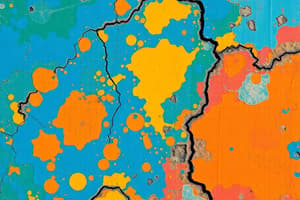Podcast
Questions and Answers
Which type of weathering involves the physical breakdown of rock into smaller pieces?
Which type of weathering involves the physical breakdown of rock into smaller pieces?
- Chemical Weathering
- Pressure Weathering
- Mechanical Weathering (correct)
- Biological Weathering
Which process in mechanical weathering is driven by external forces like water, wind, and temperature changes?
Which process in mechanical weathering is driven by external forces like water, wind, and temperature changes?
- Carbonation
- Frost Wedging
- Abrasion (correct)
- Thermal Stress
What is the most common type of chemical weathering involving the reaction between acidic water and calcium carbonate in sedimentary rocks?
What is the most common type of chemical weathering involving the reaction between acidic water and calcium carbonate in sedimentary rocks?
- Hydrolysis
- Oxidation
- Carbonation (correct)
- Hydration
Which type of weathering results in changes to the rock's chemical composition?
Which type of weathering results in changes to the rock's chemical composition?
What causes frost wedging in mechanical weathering?
What causes frost wedging in mechanical weathering?
Which external force drives thermal stress in mechanical weathering?
Which external force drives thermal stress in mechanical weathering?
Flashcards are hidden until you start studying
Study Notes
Weathering: The Breakdown of Rock
Weathering is the process by which rocks are broken down into smaller pieces, shaping the Earth's landscape. Weathering occurs through two main types: mechanical and chemical. Both types result in the breakdown of rocks, but they do so in different ways.
Mechanical Weathering
Mechanical weathering, also known as physical weathering, involves the physical breakdown of rock into smaller pieces. This process is driven by external forces such as water, wind, temperature changes, and biological activity. The most common types of mechanical weathering include:
- Abrasion: The wearing away of rock by friction between moving parts of the Earth's surface, like wind and water.
- Frost Wedging: The expansion of ice within cracks in rock due to freezing temperatures, causing the rock to split apart.
- Thermal Stress: The expansion and contraction of rock due to temperature changes, which can cause cracks and fractures.
Chemical Weathering
Chemical weathering, on the other hand, occurs when rocks are broken down by chemical processes. This involves changes to the rock's chemical composition, often through interaction with water, oxygen, or other substances. The most common types of chemical weathering include:
- Carbonation: The reaction between slightly acidic water and calcium carbonate in sedimentary rocks, such as limestone or chalk, causing them to dissolve.
- Hydrolysis: The breaking down of rock by acidic water, which can cause the rock to rot.
- Oxidation: The breakdown of rock by oxygen and water.
Both mechanical and chemical weathering play crucial roles in shaping the Earth's landscape and contributing to the formation of new landforms. Understanding these processes helps us better comprehend the geological forces at work in our world.
Studying That Suits You
Use AI to generate personalized quizzes and flashcards to suit your learning preferences.




